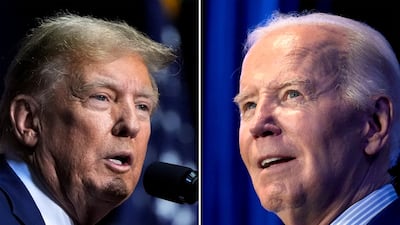Few issues will play as central a role in determining the winner of the US 2024 presidential election as the economy.
According to an ABC/Ipsos poll, a large number of voters say financial issues – either the economy or inflation – will be the deciding factor in who they vote for.
That spells bad news for President Joe Biden's re-election chances against Donald Trump.
The Democratic incumbent's approval ratings have been dragging for years now and he has failed to convince voters that they are better off financially with him in charge.
Americans have been consistently pessimistic over the US economic outlook since May 2021, according to data from polling organisation Gallup.
According to its May release, 70 per cent of Americans believe the economy is “getting worse” while 26 per sent say it is “getting better”. That minus 44 net optimism score is the lowest since November (minus 49).
Mr Biden has responded by going after Trump's economic record, saying the economy was “in free fall” when he took over, highlighting the nation's unemployment rate when he took office.
He also knocked Trump over the federal deficit. According to an analysis from the Committee for a Responsible Budget, Trump approved $4.8 trillion of new 10-year borrowing when excluding Covid-relief bills. A major contributor to that was Trump's 2017 tax plan, the organisations said.
The President, meanwhile, has so far approved $2.2 trillion of new 10-year borrowing when excluding Covid relief, the analysis found
The economy has hit several notable thresholds with Mr Biden in office: major stock indexes hit record highs, the unemployment rate dropped to a record low and a net gain of 15 million jobs was registered.
But voters are not so optimistic. Only 16 per cent say they are better off since Mr Biden assumed office in 2021, versus 43 per cent who say they are not, according to ABC News/Ipsos polling.
The same poll found voters trust the former president more to handle the economy by a 48-32 margin, and by a 44-30 margin when it comes to managing inflation.
Trump tried to leverage this during the first presidential debate on CNN.
“He has not done a good job. He's done a poor job, and inflation is killing our country. It is absolutely killing us,” Trump said of his rival in an attempt to burnish his own economic record during his term.
“He caused this inflation,” Trump said of Mr Biden's economic record, although economists generally agree the inflation surge was caused by supply-chain issues and a huge shift to goods because of the coronavirus pandemic.
The rise in inflation had a particularly strong effect on food, with costs rising 25 per cent from 2019 to 2023, according to the US Department of Agriculture.
Food inflation rose 9.9 per cent in 2022, larger than any increase since 1979. This affected both eating at home (11.4 per cent) and dining out (7.7 per cent). Food prices are projected to further accelerate this year, with prices for all foods predicted to rise 2.2 per cent.
These rising prices affect everyday costs citizens face – not only food costs, but housing and petrol.
In an opinion piece for the Financial Times last month, vice chairman of S&P Global Daniel Yergin wrote the price that might matter the most in this year's election will be the one at the petrol pump.
The average cost for a gallon is currently $3.49, well above the $3.09 at the beginning of the year, according to automotive company AAA.
Petrol prices surged during the onset of Russia's war in Ukraine and Mr Biden has taken some measures to control the situation, including tapping the nation's strategic petroleum reserve.
But outside factors such as Opec production cuts, a broadening crisis in the Middle East, a surge in summer demand and potential natural disasters could drive prices up again, Mr Yergin wrote.
That would put Mr Biden's re-election chances in dangerous territory. According to one analysis conducted by Moody's, Trump would be more likely to win the 2024 election if the average petrol cost creeps close to $4 per gallon.
While rising costs are hitting Mr Biden in the polls, one factor that could help him is the labour market.
The coronavirus pandemic ravaged the economy in 2020, driving the unemployment rate up to its highest level since the Great Panic. Trump had a total net loss of 2.1 million jobs by the time he left office.
“We had an economy that was in free fall,” Mr Biden said of Trump's term, although unemployment had dropped from 13.2 per cent to 6.2 per cent by the time he entered office.
Since then, workers have been returning to the labour force in droves. Mr Biden's administration has heralded recent jobs reports as “the great American comeback”.
Another factor Mr Biden has in his favour is the Dow Jones, which reached the 40,000 threshold for the first time this year.
An analysis conducted by MarketWatch showed the Dow is a reliable predictor in presidential elections.
According to the analysis published in May, Mr Biden's chances of re-election stood at 58.8 per cent based on the Dow's year-to-date, price-only gain of 5.6 per cent. The odds are projected to rise or fall based on the stock market's performance.
Considering the Dow's current year-to-date, price-only gain of about 3.9 per cent, the incumbent's odds have probably fallen while Trump's have risen.


